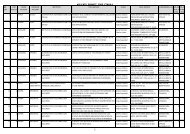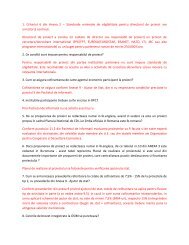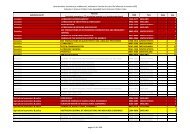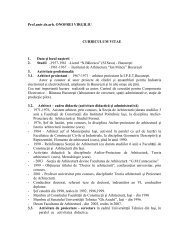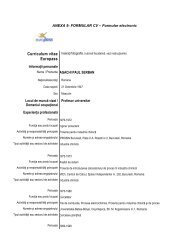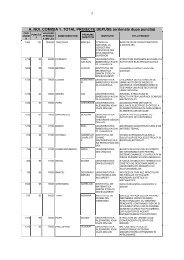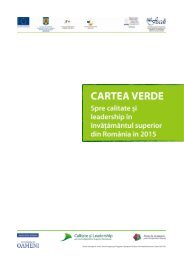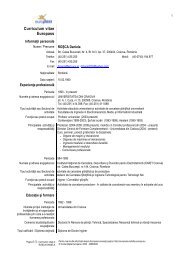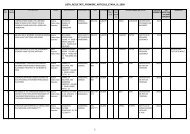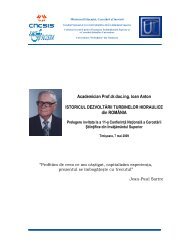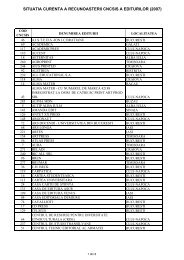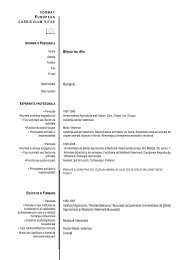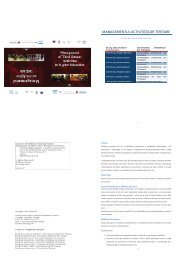Modul de formare-Managementul resurselor financiare - uefiscdi
Modul de formare-Managementul resurselor financiare - uefiscdi
Modul de formare-Managementul resurselor financiare - uefiscdi
- No tags were found...
You also want an ePaper? Increase the reach of your titles
YUMPU automatically turns print PDFs into web optimized ePapers that Google loves.
institutions will be able to un<strong>de</strong>rstand and effectively use financial-accounting information.<br />
These lea<strong>de</strong>rs rely on the accounting functions, namely:<br />
The recording and data processing function - records the value or worth of a company or<br />
organization, adhering to the principles and rules of processes and economic phenomena<br />
that occur within the organization.<br />
The information function - provi<strong>de</strong>s information (insi<strong>de</strong> and outsi<strong>de</strong> the organization) on<br />
the structure and dynamics of assets, financial positions, and results obtained for grounding<br />
<strong>de</strong>cisions.<br />
The managing control function - checks with the accounting information help regarding the<br />
manner of storage and use of the material and monetary values, the resource management,<br />
and monitoring the compliance with the financial discipline, etc..<br />
The legal function – focuses on that information provi<strong>de</strong>d by accounting and evi<strong>de</strong>nce<br />
documents that are used as proofs in court to prove the existance of some economic<br />
operations and to establish the liability for pecuniary damage.<br />
The estimate function - assumes that accounting information related to an already<br />
completed period can be used to <strong>de</strong>termine the trends of future economic phenomena and<br />
processes<br />
. Insi<strong>de</strong> the university, in all its operational mechanism, the functioning organization of<br />
accounting is a management issue. With many implications, the university commits resources<br />
(material, human, financial, information). Un<strong>de</strong>r the current legal provisions, the responsibility<br />
for organizing and keeping the accounts belongs to the manager, credit officer or any other<br />
person who is liable of entity management<br />
For each institution, their prime objective is to solve all their financial problems, this places a<br />
particularly importance on accounting policies. They are based on principles, bases,<br />
conventions, rules, and practices specific to the ongoing activities of preparing and presenting<br />
relevant and pertinent financial statements. Applying of appropriate accounting policies for<br />
higher education institutions can provi<strong>de</strong> a real "professional reasoning" a true "quality<br />
judgement" and a real "materiality".<br />
In this regard, the 10 "commandments" in accounting are 28 :<br />
The Going Concern Principle - the university continues its normal operation in a<br />
predictable way without going to be unable to continue its activity or without significant<br />
reduction of it (the activity continuity or closure must be un<strong>de</strong>rstood in financial meaning).<br />
The Consistency Principle – It is mandatory to continue appllying the same rules and<br />
regulations on assessment, accounts recording, and property elements and results<br />
presentation, while ensuring the accounting information compatibility, over time.<br />
The Conservatism Principle – It is not allowed to overestimate the assets and incomes,<br />
respectively to un<strong>de</strong>restimate the liabilities and costs, taking into account the <strong>de</strong>preciations,<br />
the risks and potential losses arising from the current or prior year’s activity.<br />
The In<strong>de</strong>pen<strong>de</strong>nce Principle – It will consi<strong>de</strong>r all relevant incomes and expenditures for<br />
that financial year reporting, without taking into account the date of receipt or payment<br />
amounts (accrual accounting).<br />
The Separation Principle - to <strong>de</strong>termine the total amount associated to balance sheet items,<br />
each item’s value will be estimated individually. Each individual component of assets or<br />
28 Source: Ord.M.F.P.nr.1752/2005,M.Of.nr.1080/30 nov.2005; "Reglementări contabile conforme cu Directiva a<br />
IV-a a Comunităţii Economice Europene" published by the romanian parlament ; Drăgan C.M., „Contabilitatea<br />
instituţiilor publice armonizată cu standar<strong>de</strong>le internaţionale”,Ed. A.S.S.C.,Bucureşti, 2005<br />
45



